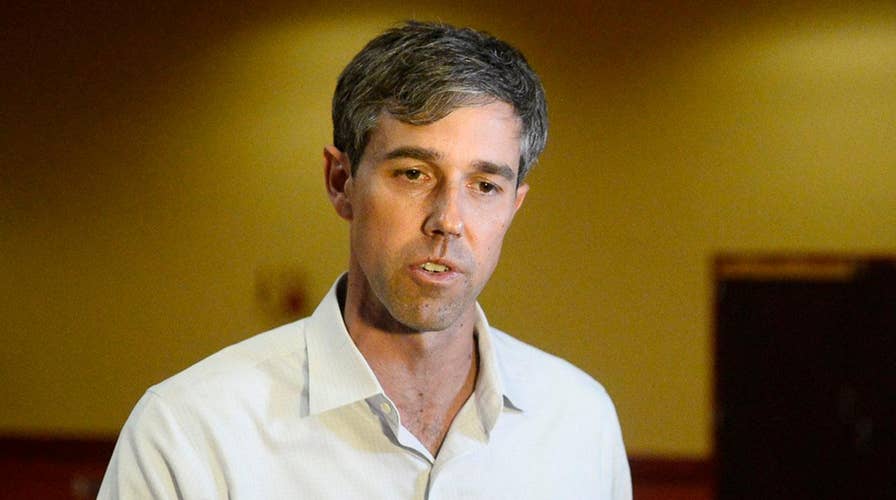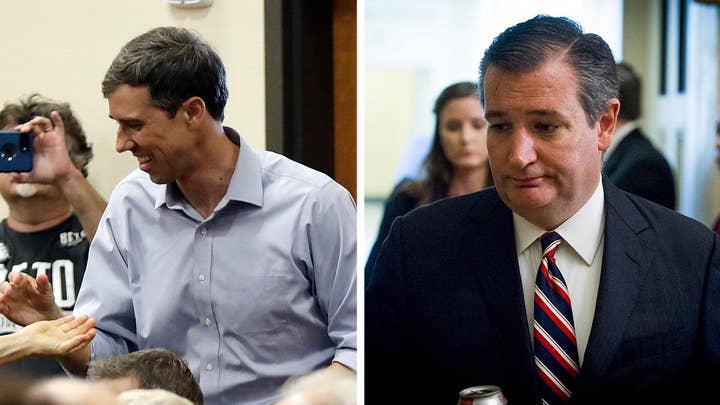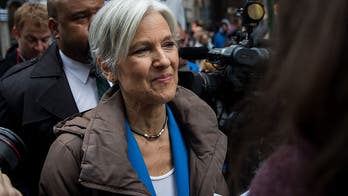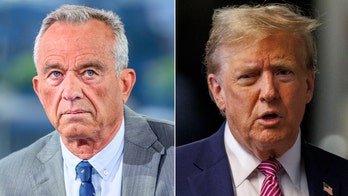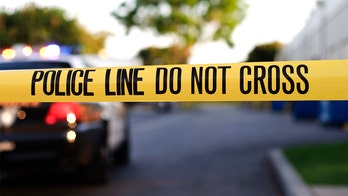New details about Beto O'Rourke's 1998 DWI arrest
According to police reports, Texas Senate Democratic nominee Beto O'Rourke tried to flee the scene after drunken crash; analysis from Fox News politics editor Chris Stirewalt.
Texas Democratic Rep. Beto O'Rourke, who is leading an insurgent challenge against incumbent Ted Cruz, claimed during a debate on Friday that he never left the scene of a DWI crash near El Paso in 1998, but a leading Washington Post fact-checker challenged the claim, giving it "four Pinocchios."
On the evening of his 26th birthday, O'Rourke crashed into a truck traveling in "the same direction" at high speed in a 75 MPH zone before crossing the median into opposite lanes of traffic and coming to a stop, a witness told a police officer at the time.
O'Rourke had a blood alcohol content of 0.136, well above the legal limit of 0.10 at the time, as well the current limit of 0.08.
“The defendant/driver then attempted to leave the scene,” the police officer, Richard Carrera, said in a police report. The witness "then turned on his overhead lights to warn oncoming traffic and try to get the defendant to stop.”
According to the officer, O'Rourke had "glossy" eyes and was "unable to be understood due to slurred speech.”
"I did not try to leave the scene of the accident."
The incident report from the night also stated that "the driver attempted to leave the accident but was stopped by the reporter."
But on Friday, O'Rourke rejected that account -- the first time he has gone on record disputing that he tried to leave the scene of the DUI.
MORE ON THE DEBATE: CRUZ, O'ROURKE CLASH OVER TRUMP, IMMIGRATION
"I did not try to leave the scene of the accident, though driving drunk -- which I did -- is a terrible mistake, for which there is no excuse of justification or defense," O'Rourke said, before talking about the importance of "second chances," white privilege and how he met his wife.
Cruz did not press the issue during the debate, saying he wanted to focus on issues.
On Tuesday, The Washington Post, citing additional police documents first obtained by The Houston Chronicle and The San Antonio Express-News, concluded that O'Rourke's denial was unfounded.
"Given his blood alcohol content at the time of the crash, O’Rourke’s memory 20 years after the fact is not nearly as credible as the police reports written just hours after the crash," The Post's Glenn Kessler wrote in his fact-check.
Kessler acknowledged that he had been unable to find the unnamed witness or the police officer for further comment, and that some minor details -- such as the color of O'Rourke's Volvo, and its direction of travel -- were inconsistent across the police documents.
"O’Rourke could have dodged the question during the debate or he could have said his memory of the night is not clear," Kessler wrote, after noting that contemporaneous witness accounts have more credibility than after-the-fact denials decades later. "Instead, he chose to dispute the factual record."
The Post's fact-checking scale lists "Four Pinocchios" as the most a claim can receive -- for "whoppers."
After he completed a court-ordered program, the charges against O'Rourke were dismissed, The Houston Chronicle reported. O'Rourke is the son of an El Paso County Judge, although there are no indication his political influence helped him obtain a lighter sentence.
O'Rourke's criminal record also includes a 1995 charge for allegedly burglarizing a building by attempting "forcible entry" at the University of Texas at El Paso (UTEP), according to The El Paso Times.
"That happened while I was in college," O'Rourke said in 2005. "I along with some friends were horsing around, and we snuck under the fence at the UTEP physical plant and set off an alarm. We were arrested by UTEP police. ... UTEP decided not to press charges. We weren't intending to do any harm."
The charge was dropped.
The next debate between the candidates is scheduled for Sept. 30 at the University of Houston, with the final encounter set for Oct. 16.
